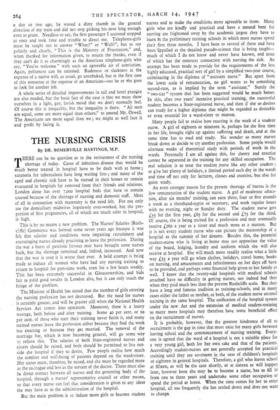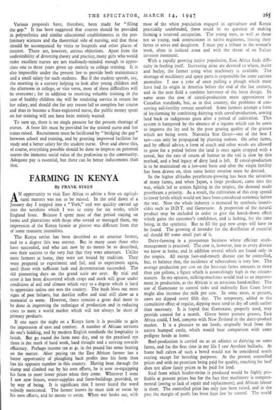THE NURSING CRISIS
By DR. SOMERVILLE HASTINGS, M.P.
THERE can be no question as to the seriousness of the nursing shortage of today. Cases of infectious disePse that would be much better treated in hospital have to be dealt with at home ; sanatoria for tuberculosis have long waiting lists ; and many of the aged and chronic sick have to be nursed in their homes or remain evacuated in hospitals far removed from their friends and relations. London alone has over 7,000 hospital beds that have to remain unused because of the shortage of nursing and domestic staff. Most of all in connection with maternity is the need felt. For not only are the domiciliary midwives hopelessly over-worked, but the pro- portion of first pregnancies, all of which are much safer in hospital, is high.
This is by no means a new problem. The Nurses' Salaries (Rush- cliffe) Committee was formed some seven years ago because it was felt that salaries and conditions were impairing recruitment and encouraging nurses already practising to leave the profession. During the war a burst of patriotic fervour may have brought some nurses back, but the shortage remained and, indeed, increased. And now that the war is over it is worse than ever. A bold attempt is being made to induce all women who have had any nursing training to return to hospital for part-time work, even for a few hours weekly. This has been extremely successful in Gloucestershire, and bids fair to yield good results in London also, but it can only touch the fringe of the problem.
The Minister of Health has stated that the number of girls entering the nursing profession has not decreased. But the need for nurses is certainly greater, and will be greater still when the National Health Services Act comes into' operation. Moreover, there is a heavy wastage, both before and after training. Some 40 per cent, or so per cent. of those who start their training never finish it, and many trained nurses leave the profession either because they find the work too exacting or because they get married. The removal of the marriage bar, which is now becoming general, will go some w'ay to relieve this. The salaries of both State-registered nurses and sisters should be raised, and both should be permitted to live out- side the hospital if they so desire. Few people realise how much the comfort and well-being of patients depend on the ward-sister. Her status must, therefore, be raised, and she must be regarded more as the coileague and less as the servant of the doctor. There must also be direct contact between all nurses and the governing body of the hospital, through a nurses' representative council or other means, so that every nurse can feel that consideration is given to any ideas she may have as to the administration of the hospital.
But the main problem is to induce more girls to become student
nurses and to make the conditions more agreeable to them. Many girls who are kindly and practical and have a natural bent for nursing are frightened away by the academic jargon they have to learn hi the preliminary training schools in which most nurses spend their first three months. I have been to several of these and have been Sppalled at the detailed pseudo-science that is being taught— much of which I do not know and never have known, and none of which has the remotest connection with nursing the sick. An attempt. has been made, to provide for the requirements of the less highly educated, practical sort of girl by a simplified two-year course, culminating in the diploma of "assistant nurse." But apart from the lower scale of remuneration, no girl wants to be something second-rate, as is implied by the term "assistant." Surely the " two-tier " system that has been suggested, would be much better. In this, after two years' intensive practical training, the successful student becomes a State-registered nurse, and then if she so desires can study for a higher diploma that might be regarded as desirable or even essential for a ward-sister or matron.
Many people fail to realise how exacting is the work of a student nurse. A girl of eighteen or nineteen is, perhaps for the first time in her life, brought right up against suffering and death, and at the same time has to read and study. No wonder so many nurses break down or decide to try another profession. Some people would alternate weeks of theoretical study with periods of work in the wards. Personally I am all against this, for theory and practice cannot be separated in the training for any skilled occupation. The real solution is to treat the stud= nurse like any other student ; to give her plenty of holidays, a limited period each day in the wards and time off not only for lectures, classes and exercise, but also for quiet study.
An even stronger reason for the present shortage of 'nurses is the low remuneration of the student nurse. A girl of moderate educa- tion, after six months' training, can earn three, four or five pounds a week as a shorthand-typist or secretary, and work regular hours with no evening, night or Sunday duty. The student nurse gets L55 for the first year, £65 for the second and £75 for the third. Of course, she is being trained for a profession and may eventually receive L260 a year as a sister and much more as a matron. But it is not every student nurse who can picture the matronship of a hospital as the summit of her dreams. Besides this, the potential student-nurse who is living at home may not appreciate the Value of the board, lodging, laundry and uniform which she will also receive at hospital. She will much more readily realise what a little way £55 a year will go when clothes, holidays, travel home, books on nursing, and amusements and refreshments on her days off have to be provided, and perhaps some financial help given to her family as well. I know that the twenty-odd hospitals with medical schools attached have no difficulty in getting nurses, nor indeed had they when they paid much less than the present Rushcliffe scale. But they have a long and famous tradition as training-schools, and in many cases either the father or mother, or both, of the student nurse secured training in the same hospital. The unification of the hospital system under the new Act and the extension of medical student-training to many more hospitals may therefore have same beneficial effect on the recruitment of nurses.
It is probable, however, that the greatest hindrance of all to recruitment is the gap in time that must exist for many girls between leaving school and the commencement of nursing training. Every- one is agreed that the ward of a hospital is not a suitable place for a very young girl, both for her own sake and that of the patients. Accordingly student-nurses are not generally accepted for practical training until they are seventeen in the case of children's hospitals or eighteen in general hospitals. Therefore, a girl who leaves school at fifteen, as will be the case shortly, or at sixteen as will happen later, however keen she may be to become a nurse, has to fill in from one to three years and undertake some other occupation or spend the period at home. When the time comes for her to enter hospital, all too frequently she has settled down and does not want to change
Various proposals have, therefore, been made for "filling the gap." It has been suggested that courses should be provided in polytechnics and similar educational establishments in the pre- liminary sciences and the theoretical side of nursing, and that these should be accompanied by visits to hospitals and other places of interest. There are, however, serious objections. Apart from the undesirability of divorcing theory and practice, many girls who would make excellent nurses are not studiously-minded enough to appre- ciate one to three years given up entirely to college training. It is also impossible under the present law to provide both maintenance and a small salary for such students. But if the student spends, say, the morning in a nursery helping to look after young children and the afternoon in college, or vice versa, most of these difficulties will be overcome ; for in addition to receiving valuable training in the care of healthy children she will be rendering service in return for her salary, and should she for any reason fail to complete her course and thus to become a State-registered nurse, the public money spent on her training will not have been entirely wasted.
To sum up, there is no single panacea for the present shortage of nurses. A freer life must be provided for the trained nurse and her status raised. Recruitment must be facilitated by "bridging the gap" between school and training, and by granting improved facilities for study and a better salary for the student nurse. Over and above this, of course, everything possible should be done to impress on potential nurses the immense social value of the profesion to the community. Adequate pay is essential, but there can be better inducements than that.



































 Previous page
Previous page